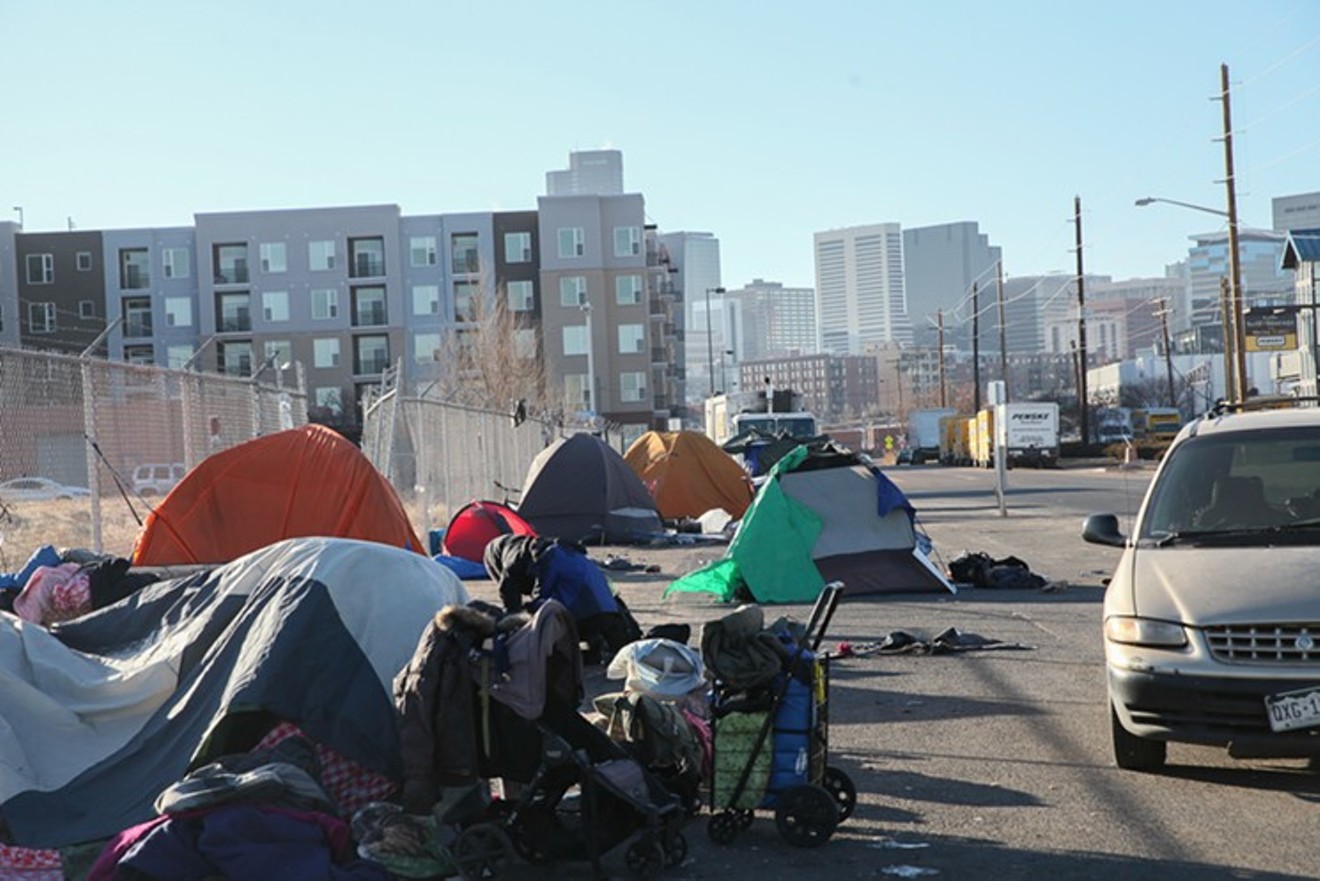It's a hurry-up-and-wait situation for the thousands of homeless plaintiffs represented in a class action lawsuit against Denver concerning the city's sweeps of homeless encampments.
The long-awaited jury trial in federal district court is scheduled to begin March 18, 2019, and end ten days later, nearly two and a half years after the case was filed.
For anyone needing a refresher, Denver is being sued over its large scale cleanups of homeless encampments. In August 2016, civil-rights attorney Jason Flores-Williams sued the city on behalf of individuals experiencing homelessness who claimed that their Fourth and Fourteenth Amendment rights (protection against unlawful searches and seizures and the equal-protection clause, respectively) were violated as police and other city employees confiscated — and in some instances trashed — their belongings during a number of well-documented sweeps.
As Westword has chronicled, “Then, in April 2017, the case became a big deal when U.S. District Court Judge William Martinez took the rare step of granting class certification, making every person experiencing homelessness in Denver (over 3,000 people) a plaintiff in the case against the city. Flores-Williams called the ruling 'historic' at the time, and the suit soon gained additional firepower when civil-rights attorney David Lane jumped on board as Flores-Williams’s co-counsel.”
Both the plaintiffs and the city then filed for summary judgment, which Martinez subsequently rejected, leading to what Flores-Williams has characterized as a “monster trial” in which a jury will determine whether Denver violated any constitutional protections during homeless sweeps.
Today, June 12, was the latest hearing in the case, and the court and lawyers on both sides determined when that jury trial would take place. Beyond setting the date, there were a number of “special issues," as Martinez characterized them, that needed to be resolved.
Here's a summary of what happened:
1. Individuals who have either lost or don't have government-issued IDs (usually required to enter a federal courthouse) will still be able to attend the jury trial next year if Flores-Williams's or Lane's law offices vouch for them. “I'd say, regularly, six people per day won't have their IDs,” Flores-Williams told the judge when asked for an estimate and why the provision was necessary. The lawyer also said that some individuals experiencing homelessness have had IDs confiscated during sweeps.
2. The city's lawyers tried, unsuccessfully, to have seven named witnesses in the case removed, three of whom had not shown up for scheduled depositions (Flores-Williams argued that he had lost track of two of them). Martinez ruled that the witnesses could still participate in next year's trial as long as Flores-Williams's and Lane's office tracked all seven witnesses down and allowed the city to depose them by September 15 of this year.
3. There was a lengthy fight over whether Terese Howard, the firebrand activist with Denver Homeless Out Loud, will have to produce documents, including over a hundred pages of communications between her and Flores-Williams, that the city requested in the discovery phase of the trial. The city argues that it should be able to access the documents if Howard is called to testify as a witness, and that since she is not a named plaintiff, she doesn't have attorney-client privileges protecting the communications. Flores-Williams characterized Howard as a special investigator with his office and said the motion was an attempt by the city to “infiltrate” Denver Homeless Out Loud. Martinez requested more detailed motions by both the city and the lawyers suing Denver on behalf of the homeless. Though the judge seemed to want to ensure that Howard could testify, he also added that in his courtroom, he tries to avoid “trial by ambush” and wants attorneys on both sides to have access to any and all relevant evidence.
4. Flores-Williams requested permission from Martinez to allow a bus from the California nonprofit Lava Mae to park on or near the Alfred A. Arraj Courthouse campus during the trial. The bus is outfitted with showers and offers fresh clothes, which Flores-Williams said would give homeless attendees dignity throughout the trial. Martinez responded that he does not control parking on city streets, and suggested that Flores-Williams check with nearby homeless service providers to see if the Lava Mae bus could park in their private lots.
[
{
"name": "Air - MediumRectangle - Inline Content - Mobile Display Size",
"component": "12017618",
"insertPoint": "2",
"requiredCountToDisplay": "2"
},{
"name": "Editor Picks",
"component": "17242653",
"insertPoint": "4",
"requiredCountToDisplay": "1"
},{
"name": "Inline Links",
"component": "18838239",
"insertPoint": "8th",
"startingPoint": 8,
"requiredCountToDisplay": "7",
"maxInsertions": 25
},{
"name": "Air - MediumRectangle - Combo - Inline Content",
"component": "17261320",
"insertPoint": "8th",
"startingPoint": 8,
"requiredCountToDisplay": "7",
"maxInsertions": 25
},{
"name": "Inline Links",
"component": "18838239",
"insertPoint": "8th",
"startingPoint": 12,
"requiredCountToDisplay": "11",
"maxInsertions": 25
},{
"name": "Air - Leaderboard Tower - Combo - Inline Content",
"component": "17261321",
"insertPoint": "8th",
"startingPoint": 12,
"requiredCountToDisplay": "11",
"maxInsertions": 25
}
]













